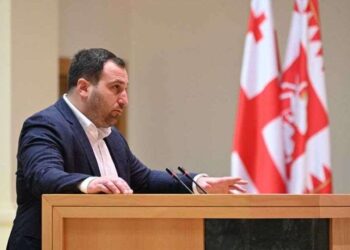On December 29, 2022, the People’s Power, a populist faction movement affiliated with the ruling party, Georgian Dream, presented a draft law which will envisage creating a registry for “agents of foreign influence”. According to the idea, “the definition of an agent of foreign influence will be introduced,” and “the direct involvement of the state in a number of processes that envisage the privileging of individuals or legal entities with foreign funding will be ensured.”
On February 14, 2023, the movement initiated a bill on the activities of foreign-funded organizations with the plan to register it officially in parliament. Georgian Dream agreed with this position. The draft law, if successfully adopted by the Georgian Parliament in the near future, would put CSOs in a vulnerable position. If the Georgian Parliament adopts the law on agents of foreign influence, it will mark a decisive turn away from Georgia’s European integration and could negatively impact perspective for future European financial aid. In the frameworks of Expert Evaluation, GIP asked established Georgian and international experts if they agree or disagree with that notion.
Below are nine of the 29 answers provided.* Compiled by the team of the Georgian Institute of Politics.
Hubertus Jahn – Professor of the History of Russia and the Caucasus, University of Cambridge
This policy was first adopted and used in the Russian Federation. Its outcome there is for everyone to see. It has led to a complete dismantling of democratic and civil society structures and the rise of an autocratic and corrupt dictatorship, accompanied by numerous arbitrary punishments and incarcerations of innocent individuals. This policy stands diametrically opposed to legal practices and traditions of freedom in Europe. This will effectively stop the European integration process of Georgia (which may well be the intention behind the proposed law in the first place). It will have serious long-term effects on Georgia’s economic prosperity and development, and it will negatively affect the aspirations of Georgia’s young and educated generation, many of whom may even consider leaving the country (just as in Russia).
Stephen Jones – Director, Georgian Studies Program, Harvard University
This is a provocative bill, and I hope it is decisively rejected by the Georgian parliament. It is modeled on the legislation of Russia and other authoritarian states. It is the beginning of a process which will chip away at the freedom of Georgia’s CSOs to freely organize without fear of government restrictions, and to express dissent. Georgian CSOs and their freedom of action are essential to the proper functioning of Georgia’s democracy. Without them, Georgia’s citizens will not have access to the informed analysis and commentary they require. But this bill, if it becomes law, will cast a deeper shadow over Georgia’s media and other parts of Georgian civil society. Anyone can be declared a “foreign agent;” it is an ominous reference to Soviet times when being “foreign” was dangerous. This bill is counter to Georgia’s aspiration for democratic openness, and will undermine the goal of EU membership.
Julie George – Associate Professor of Political Science, Queens College, CUNY
Laws on foreign influence are a way to isolate and harass civil society groups whose voices, while sometimes difficult to hear, are the essence of democratic governance. Democracies are difficult to govern. But they are the safest societies. Georgians deserve to live in a democracy. It could be that the current Georgian leadership does not intend to suppress voices, but merely mark them. Even so, in those countries that have created foreign agency laws, over time the power of ALL civil society has eroded. Media freedoms have collapsed. Authoritarian regimes have emerged every time. This trajectory is well studied and well-known. This law, then, is not merely a law – it’s a signal to the West that Georgia’s efforts to build democracy have ended. The Georgian government will have abandoned its people, who have worked for so long and endured so much to build the promise of an open and safe Georgia.
Lincoln Mitchell – Columbia University
While passing such a law would not help Georgia’s European integration, many in Europe have already pushed Georgia to the back of the line, so passing a law like this will not be decisive in any way.
Helge Blakkisrud – Associate Professor, University of Oslo
To adopt a law ‘on foreign agents’ in the current situation would be to send a fundamentally wrong signal to Brussels and to European capitals. While across the European Union, member states are concerned about how external powers might seek to exploit domestic vulnerabilities through fake news and influence operations, a law on foreign agents as envisioned by the current proposal is not the way forward if Georgia is seeking further integration with the EU.
Christofer Berglund – Associate Professor, Malmö University
GD has time and again demonstrated that it has zero interest in ensuring rule of law. After cracking down against opposition politicians and critical media outlets, this draft law creates conditions for harassing CSOs too. It makes no sense for the EU to extend financial let alone political support to a state that demonstrates blatant disregard for its values.
Stefan Meister – DGAP, Head of Center for Order and Governance in Eastern Europe, Russia, Central Asia
The current Georgian government has left the transatlantic and European integration path. Its actions against the media, undermining the rule of law and now the foreign agent law, are seen in Brussels and the EU member states as very critical, because all together it undermines key elements of integration with the EU. The foreign influence law reminds us of practices we know from Russia, which tries to minimize international contacts and funding for civil society. All this is about the control and isolation of society. For Georgia’s path to Europe, a vibrant civil society is crucial. International contacts are very important. A lot of activities are funded from abroad which are important to develop the human potential of the country, for education, international exchange, to keep young people which have very limited perspective in the country. Independent media is financed from abroad, which is not fueling polarization but provides fact-based quality information and investigative research. Many services for Georgian society are not funded by the Georgian state, but by foreign donors, first of all from Europe and the US. If all this is not possible anymore, the situation in society will worsen and more young people will leave the country. Such a law would undermine granting a candidate status for Georgia. Georgia had a strong image as a reform country in the past. It still performs best in many areas in reforms in the context of the Association Agreement with the EU. But that is a legacy from the past. Without rule of law, independent media, free and fair elections and strong civil society, no EU integration for the country will be possible. Georgia’s big assets in the past two decades were its openness to foreigners and vibrant civil society. Such a law will destroy this important advantage Georgia has with regard to many other post-Soviet countries, and will bring it closer to the Russian political culture and repressive policy. Russia will only become weaker and lose more influence with its war against Ukraine. Any rapprochement with Russia and compromise, any disinformation campaign in line with Russian narratives, will have not only a negative impact on the political culture of the country, but will burn bridges towards European and transatlantic integration. I can only confirm this from my talks with Brussels institutions and in the member states. A big shift is going on in the perception of Georgia, and this law and anti-Western and anti-European narratives and policy is very distractive.
Thomas de Waal – Senior Fellow, Carnegie Europe
This proposed legislation has echoes of Russia’s “foreign agent law” and, if passed, would clearly do a lot of damage to Georgia’s European aspirations. But let’s be clear on what this is really about. This initiative is very unlikely to pass and is better seen as a deliberate provocation. It’s the work of a group of politicians who have no interest in Georgia joining the EU and who want to advance their agenda and gain fame by picking a public fight with Western politicians. Caution, restraint and skepticism which do not give these provocateurs too much “oxygen of publicity” are needed in coordinating the response.
Giorgi Isakadze – Host & Editor at BMG, Editor in Chief at Forbes Georgia
I do not see strong institutions in Georgia that would be capable of revealing “agents of influence” in the country, which falls more into the realm of intelligence services and law enforcement rather than political connotation. The latter could skillfully be used as a political tool to damage the reputation of certain people unacceptable to the government. The contents and name of the initiative evoke direct association with the existing Russian legislation, under which hundreds of people, who were in any way unacceptable for the regime, were labeled “agents of foreign influence” and registered as foreign.
* To view the full document, click here.














